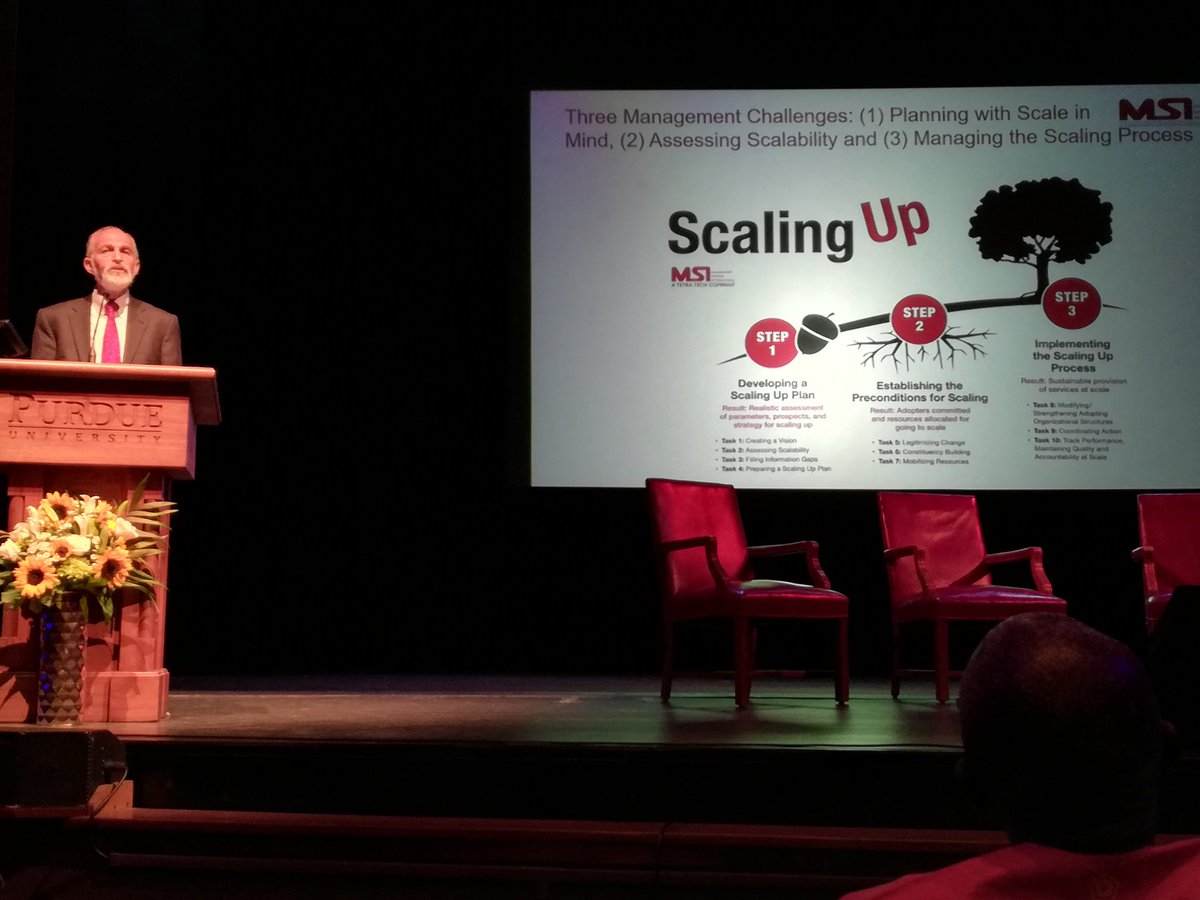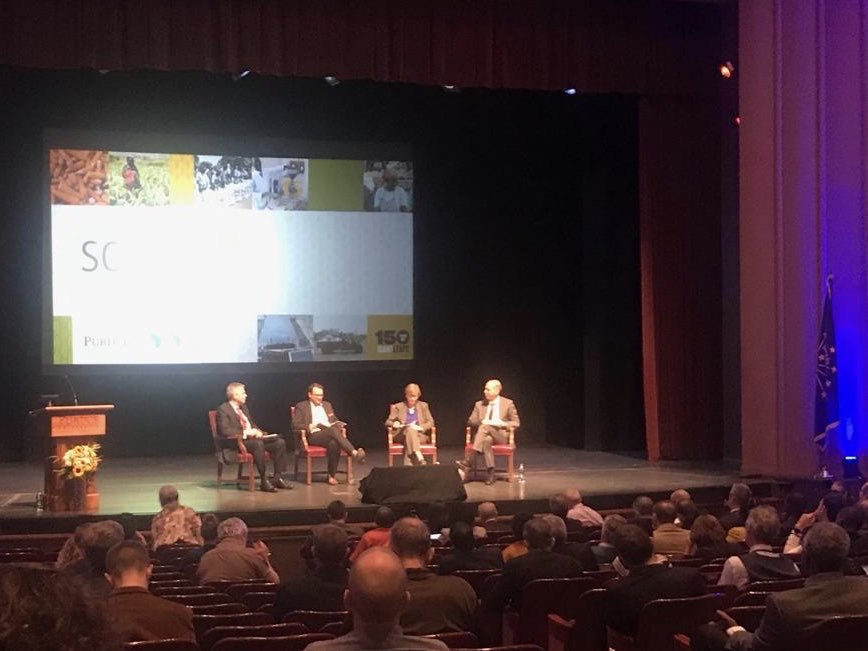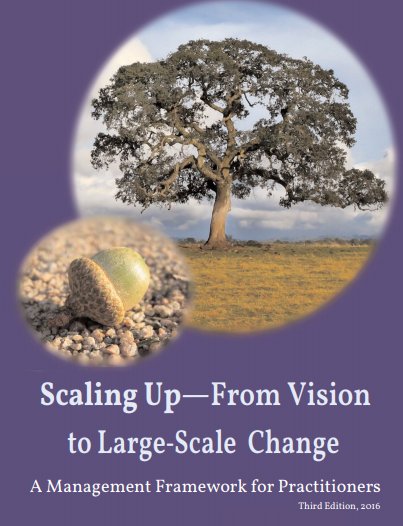Hereunder are the blog posts
related to ARD activities in September 2018 in chronological order
28 September 2018.
Brussels. DevCo Infopoint. Mobilising private-sector investment to mitigate
climate change in Africa
28 September 2018. New
York. The International Forum on Food and Nutrition, was held to promote a
dramatic change in the mindset of all stakeholders in a coordinated, unified
manner.
27 September 2018. News
& Analysis on Food & Beverage Development - Europe Special Edition:
Doing food business in Africa
25-27 September 2018.
Purdue University, West Lafayette, Indiana, USA.
24-26 September, 2018. Addis Abeba. Workshop African Food Safety
Index (AFSI)
26 September 2018. This
year Climate Week came on the heels of the Global Climate Action Summit in San
Francisco, California, US.
25 September 2018. This
meeting, called Exploring the Link Between Conflict and Global Hunger, was
co-hosted by The Netherlands, the United States, the European Union, Sweden,
FAO, IFAD, and WFP.
25 September 2018.
Transforming food systems was the focus of an event that aims to “stretch the
very fabric” of SDG 2, organized by Kellogg, FReSH and the SDG 2 Advocacy Hub.
25 September 2015. Food
System Approaches to the Prevention of Non Communicable Deseaeses
25 September 2018 - Press
briefing by Mr. Neven Mimica, European Commissioner for International
Cooperation and Development and Mr. José Graziano da Silva, Director-General of
the FAO
25 September 2018. New
York. Financing Sustainable Agriculture: Global Challenges & Opportunity.
A multimedia
exhibit on ‘Tech and the end of hunger’ presented by the World Food Programme
(WFP), Global Pulse, and the Global Partnership for Sustainable Development
Data (GPSDD).
25 September 2018. New
York. The OECD, UN Environment and the World Bank Group hosted a high-level
discussion on Financing Climate Futures
24 September 2018. IFAD,
FAO and GPSDD (Global Partnership for Sustainable Development Data (GPSDD)) continued
their focus on ending hunger, along with the governments of Kenya, Ghana and
Sierra Leone, and the Gates Foundation, hosting an event on ‘Data to end
hunger.
23 September 2018.
Partnering to Address Acute Food Insecurity.
The spice of
life: the fundamental role of diversity on the farm and on the plate
Seth Cook
Report/paper, 56 pages
25 September 2018.
Webinar.
25 September 2018.
Trinidad. Webinar
24-26 September 2018. Cape
Town, South Africa.
24 September 2018. New
York. The Africa Adaptation Initiative High Level meeting co-hosted by the
Africa Union and the United Nations Development Programme (UNDP) attracted over
80 High-level representatives from national governments, multilateral
institutions, scientific bodies and global climate change bodies such as UNFCCC
24-28 September 2018.
Mangochi, Malawi. Sixth International Conference of the PanAfrican Fish and
Fisheries Association (paffa). The organisers have received 230 abstracts to be
presented by contributors from 37 different countries.
24 September 2018.
Dakar. A farmer from Burkina Faso who
popularized an ancient farming technique to reverse desertification is among
the winners of Sweden's "alternative Nobel prize".
24-26 September 2018.
Khartoum Sudan. AICTO and the Arab Organization for Agricultural Development
(AOAD) launched the initiative: 1 Inter-Regional Smart Agriculture Forum (ISAF)
24-25 September 2018.
Nairobi.
23 September 2018. Ghent,
Belgium
20-21 September, 2018, Nairobi-Kenya.
20 September 2018.
Washington, DC. Embassy of France. BOOK TALK: Serge Michailof: Africanistan,
Development or Jihad.
19-21 September 2018.
Uppsala, Sweden. Engaging Africa Diaspora in Knowledge Transfer through
Networking.
19 September 2018.
Webinar.
16-19 September 2018.
Gent, Belgium. Tropentag 2018. Poster presentation: South-South Learning to
Advance Cavy Culture in Sub-Saharan Africa.
18 September 2018. Gent,
Belgium. Tropentag. Video interview with Yann E. Madode - with his CIRAD
partner Aurelien Briffaz of the ICOWPEA project (Increasing Cowpea value chain
sustainability in West Africa through product and process innovation)
19 September 2018.
Brussels. The latest Brussels Development Briefing
18 September 2018. Gent. In
June 2016 The German Ministry for Food and Agriculture (BMEL) and The Federal
Office for Agriculture and Food (BLE) launch a call on: “Innovative approaches
of food processing in sub-Saharan Africa and Southeast Asia to improve
nutrition and to reduce food losses in quality and quantity”
19 September 2018. Gent,
Belgium. Tropentag 2018. Interview with keynote speaker Dr. Namukolo Covic,
coordinator A4NH in Ethiopia.
16-19 September 2018.
Gent, Belgium. Tropentag is an annual interdisciplinary conference on research
in tropical and subtropical agriculture, natural resource management and rural
development
37.
Tropentag
2018: Linking African Diaspora Agro Food
Entrepreneurs to Research and SMEs PAEPARD support
16 September 2018. Gent,
Belgium. Tropentag 2018 Workshop number 5.
12 September 2018. To
speak of the future, one must speak of Africa – Europe's twin continent.
12 September 2018.
Washington, DC. As part of Feed the Future Week 2018, the Board for International
Food and Agricultural Development (BIFAD) hosted a public meeting and via
live-stream on the new Feed the Future Learning Agenda.
10 September 2018. UNITAR
and Wageningen University-Environmental Sciences signed a Memorandum of
Partnership to strengthen the cooperation on the SES4Food Program.
8 September 2018. Third
Call for applications
6-7 September 2018. M’bé near Bouaké, Côte d’Ivoire. The Rice Value Chain Compact of the African Development Bank
(AfDB)-funded “Technologies for African Agricultural Transformation (TAAT)”
initiative was officially launched at the AfricaRice Research Station.
The Tanzania
Inventors and Techno-Thinkers Consortium is a non-profit organization
responsible for seeking bright inventive or innovative ideas
5 – 8 September 2018.
Kigali, Rwanda.
5 September 2018.
5 – 6 September 2018.
University of Hohenheim, Stuttgart, Germany.
29 August 2018. Bioversity
International collaborates with Biovision to encourage farming families in the
Vihiga District of Kenya to grow a wider range of vegetables, boosting their
health and self-confidence and opening up opportunities to earn money, while in
turn conserving biodiversity.
Total number of page views in the month of September 2018: 27,384
Most viewed pages on PAEPARD blog over the
past month:
|
Entry
|
Page
views
|
|
487
|
|
|
263
|
|
|
251
|
|
|
218
|
|
|
215
|
|
|
207
|













